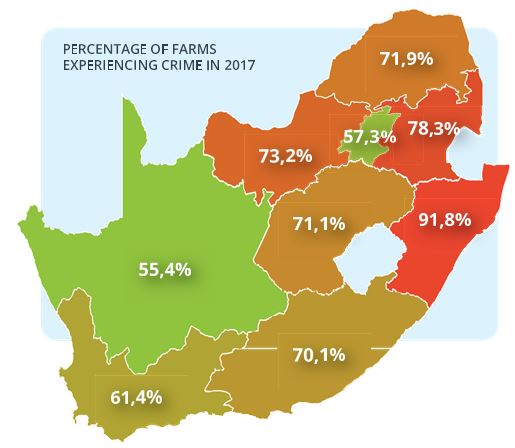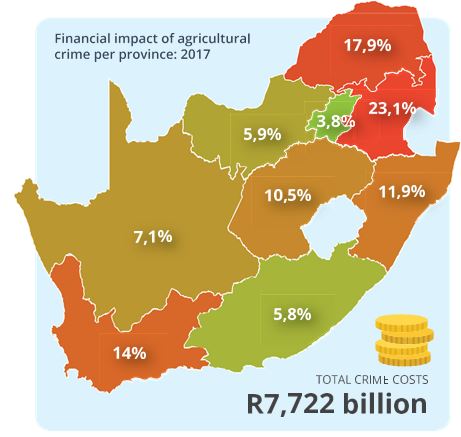CRIME STATISTICS ON FARMS CONFIRM WORRYING EXTENT
INTRODUCTION
Seven out of ten South African commercial farmers participating in a recent study by Agri SA experienced one or other form of crime in 2017.
This was but one of several startling facts about the extent of crime that South African farmers experience daily, according to the Agri SA 2018, National Agricultural Sector Crime Survey, recently commissioned to the Bureau of Market Research (BMR) of Unisa.
Equally notable from the crime study is that almost a third of commercial agricultural units experienced an increase in crime incidents during the past three years and the results emphasise Agri SA’s concerns regarding the extent of crime being experienced in commercial agriculture.
According to the BMR study the total direct cost of agricultural crime amounted to R5,45 billion in 2017, with the total replacement costs owing to agriculture crime a further R2,28 billion. This brings the overall agricultural crime-related cost to more than R7,7 billion.
The map shows that KwaZulu-Natal experienced the highest agricultural crime incidence, followed by Mpumalanga and North West with an average of 70 % countrywide. The Northern Cape seems to be the less effected by crime of all provinces.
A definite need for reliable South African agricultural crime statistics in the light of uncertainty regarding the prevalence of violent crime and agricultural property crime, led to the survey. A critical need for updated farm crime statistics owing to current data being outdated, under- reported and misreported was one of the needs that gave impetus to the research.
Prompted by concerns regarding the unacceptable high crime and violence levels, in especially rural areas, Agri SA has set itself the goal of ensuring a safe environment for all people involved in the agricultural sector. The accuracy of existing data, the monitoring of future trends and the assessment and design of crime prevention initiatives in collaboration with the government will remain an important focus area for Agri SA and its provincial organisations.
IMPORTANCE OF AGRICULTURE
Agriculture in South Africa is a major sector within the economy. This is not so much because of the gross domestic product (GDP) contribution but rather because of the support of social benefits such as employment and rural development. Many of the suggested strategies in the National Development Plan (NDP) will impact on food production or food security in some or other form. For example, expanding irrigated agriculture, supporting job creation in the upstream and downstream industries as well as selecting and supporting agriculture sectors and regions that have the highest potential.
Primary agriculture contributes nearly 3 % to the GDP and approximately 5 % to employment. The contribution to GDP, if the entire value chain of agriculture is considered, can be approximately between 10 and 12 %. Agriculture is an important part of the economy and in addition ensures South Africa’s food security. However, agriculture has a strong linkage with the manufacturing economy. The rural population is heavily dependent on agriculture as a source of employment and most small-town economies depend on the sector. Therefore, the value of agriculture cannot only be considered through its contribution to the GDP alone, but also through factors such as employment, support to the rural economy, food security and foreign exchange from exports.
RESEARCH DESIGN
The need for such a survey was discussed at the Agri SA Rural Safety Committee meeting in November in 2017, after which the organisation’s Board of Director’s approved the study in December 2017.
The 2018 study was supported by Agri SA’s provincial organisations, which assisted with the distribution of the survey link to their members. The reporting period for the study was 2017.
An optimal research strategy was designed to form the basis for the study, which consisted of two sub-parts:
- A national agricultural crime survey designed to obtain reliable crime and cost-related data from a representative sample of South African commercial farmers;
- An economic impact model using the 2018 agricultural survey data to assess the economic impact of farm crime on the sector and the total South African economy.
The BMR designed the 2018 crime survey to facilitate a quantitative research approach inclusive of a self-administered web-based survey as primary research design, which entailed a census survey among agriculturalists affiliated to Agri SA provincial organisations.
As a matter of interest, almost 48,6% of commercial farming units in the country are located in the three provinces Free State (18,9 %), Western Cape (16,8 %) and the Northern Cape with 12,9 %. However, the commercial farmers who are members of Agri Eastern Cape recorded the highest participation rate of all provinces.
AGRICULTURAL CRIME ANALYSED
The study reveals the magnitude, impact and trends of agricultural crime in an analysis of types of crime, the average and total number of agricultural commercial units affected and severity in provinces. Total losses and related matters are also discussed.
The percentage of victims affected by crime categories in 2017 is:
- Theft of livestock, which tops the list with 39,74 %;
- Theft of farm infrastructure (37,21 %);
- Theft of farm tools and equipment (34,74 %);
- Theft of game and illegal hunting (28,51 %); and
- Robbery contributing 25,05 %
The first four crimes are property related crimes, while robbery is a violent crime and one of the crimes which affects the person the most and is mostly feared because it causes harm to the person. A robbery may occur in any place and in the farming community it occurs mostly in the form of an invasion of a property with the intent to steal from the resident or to attack him/her. Property crime on the other hand, refers to crimes committed in which property is stolen with minimum or without violence. These crimes affect the livelihood of the owners thereof.
Property related crimes are usually committed by organised criminal syndicates who use their networks to sell the stolen property. To combat these crimes, good detective work supported by effective crime intelligence is needed to investigate these crimes and to have a successful prosecution in court.
In fact, of the 70 % commercial farmers who were crime victims in 2017, some had experienced a combination of the top crime categories on their farms. It is also important to note that violent crimes affected several farms in the country: Robbery, with its percentage of 25 % tops the list, followed by assault (5,7 %), attempted murder (1,3 %) and murder, 1,0%.
Consolidating the geographical distribution of crime incidents across different provinces, it is clear that:
- Malicious damage of property as well as arson and theft of farm tools and equipment are especially notable in Mpumalanga;
- Theft of livestock is predominant in the Free State and Northern Cape;
- Theft of game and illegal hunting, grazing and trespassing and theft of field crops prevails in KwaZulu-Natal;
- Burglary, theft of agricultural/farm machinery and parts and theft of agricultural inputs are predominant in Limpopo.
The study shows that a high proportion of commercial farming units in the three most affected provinces experienced crime incidents in 2017: KwaZulu-Natal (91,8 %), Mpumalanga (78,3 %) and North West (73,2 %).
The fact that the reporting of agricultural crime has weakened over the last years, has also been emphasised in the study. Among the commercial farmers who experienced crime during 2017, only 25 % reported all crimes to the police, while a further 52 % reported some crimes to the police.
The observed lack of reporting is likely to make the police and farming community underestimate the extent of agricultural crime.
According to the crime survey findings the main reasons why crimes are often not reported include:
- It is a waste of time or pointless (34,7 %);
- Police could not have done anything (19,1 %);
- Previous bad experience with the police or the criminal justice system (14,4 %);
- Do not trust the police (8,0 %); and
- Fear of reprisal or retaliation (1,3 %).
The analysis shows that almost two-thirds (63,3 %) of responding commercial farmers who experienced crime during the year indicated that the culprits who committed crimes against them were never arrested.
Crime risk mitigations issues were also reflected in the study. From the analyses it is evident that most farmers have good relationships with their employees (70,4 %), maintain a detailed register of all livestock (55,5 %) and only 6 % experiences grievances from their employees.
It is also evident that less than half of responding farmers have a good working relationship with the police (48,7 %), participate in local priority meetings with the police (25,9 %), are in a farming community that has an active Farm Watch System (41,8 %) and only 36,2 % implement the Agri SA Farm Access Protocol to manage access to their farms.
COSTS ASSOCIATED WITH AGRICULTURE CRIME
In the 2002 Agricultural Census of Statistics SA the cost of crime for farmers relating to livestock theft was R483,6 million, the cost of theft of equipment, implements and accessories was valued at R204,8 million and malicious damage to property was valued at R99,5 million.
The 2018 agricultural crime survey conducted by the BMR, estimated the total costs related to agriculture crime in 2017 and found that significant direct costs of R5,45 billion and about R2,28 billion indirect costs resulted, bringing the total crime related costs to more than R7,72 billion.
The rand value of theft of livestock added R1,13 billion, which is 130,1 % higher than the 2002 findings, while arson came to R917 million, theft of tools and equipment R848 million, which is 314 % higher than the previous findings, malicious damage to property R687 million, which is 590 % more than the 2002 Statistics SA survey and even burglary (R290 million) all added to the direct costs.
The study also found that about 40% of commercial farming units have installed security equipment in 2017 at an average cost of R115 023. The total cost was R1,9 billion.
Clear trends were noted in the financial losses in the different provinces, including:
- Financial losses experienced owing to theft of game and illegal hunting are predominant in the Free State and Limpopo;
- Burglary and theft of agricultural inputs are predominant in Limpopo and Mpumalanga;
- Financial losses experienced owing to theft of field crops are predominant in Gauteng, Limpopo, Northern Cape and Eastern Cape;
- North West had a significant financial loss due to illegal grazing and trespassing;
- Arson, malicious damage to property and theft of farm infrastructure are predominant in the Western Cape.
Provinces that showed the highest average financial losses in 2017 owing to agriculture crime were Mpumalanga with R1,77 billion, followed by Limpopo (R1,38 billion) and Western Cape (R1 billion).
The economic output loss to the South African economy owing to agricultural crime was approximately R18,92 billion, affecting agriculture (direct and indirect), and indirectly manufacturing, transport, storage, communication and also the financial, real estate and business services sectors. Manufacturing suffered significantly with an impact of R4,61 billion.
RECOMMENDATIONS
The following recommendations are made, considering the outcome of the study. These include:
The Criminals Justice System, including the police, should be strengthened by intelligence driven operations as a matter of urgency to deal effectively with agricultural related crime as well as the implementation of the NOP-recommendations as contained in chapter 12.
Awareness of initiatives by the agricultural community, police and government should be propagated among farmers more widely by role-players.
Efforts should also include motivating farmers and members of the public to report criminal activities. They must be complemented by dedicated attempts to strengthen the criminal justice system.
Considering that only 55 % of commercial farming units mark their livestock and maintain a register, more distinct crime prevention practices are required from farmers. This presupposes better law enforcement to comply with the Animal Identification Act (Act No 6 of 2002). There are merits in the argument when it is also clear that only about 18 % of commercial farming units clearly mark their farm machinery, equipment and tools and 35 % maintain an asset register.
Based on the research outcome, a follow-up study on the efficiency of crime prevention strategies applied by farmers is recommended.
Better co-operation with the local police must be promoted.
Farmers should become more involved in their Local Priority Committees.
An accessible and well-resourced Reservist-system must be in place for farmers to participate in.
Establish farm watch systems in collaboration with the local police.
The implementation of Agri SA’s Farm Access Protocol must be promoted.
Farmers should be encouraged to report all crimes to the police.
The farming community should be encouraged to improve their own home and hearth protection as well as that of their workers.
CONCLUSION
The report reveals the reality of South Africa’s commercial farmers being repeated victims of various crimes. Crimes affecting commercial farming, not only poses a threat to stability in the rural farming areas, the country as a hole, but also puts food security at risk.
Bearing in mind, that approximately 38 000 commercial farmers and their farm workers produce enough food for 57,5 million people, it means that one commercial farmer provides enough food for 1500 people on a daily basis. If food security comes under pressure, national stability and the economy of the country will also be affected negatively.
That’s why commercial farmers and their workers should be protected as an asset for the country and that is why the enhancing of the safety and security of the farming community should be a matter of national interest. More efforts should be made to combat the scourge of crime and violence in the farming areas and crime intelligence driven operations can play a vital role in the prevention of crimes with the concomitant swift reaction by security forces.
Prof Carel van Aardt en Prof Deon Tustin
Buro of Market Research: Unisa
Kobus Visser
Director: Rural Safety & Provincial Affairs: Agri SA
Issued by Agri SA, 1 October 2018



